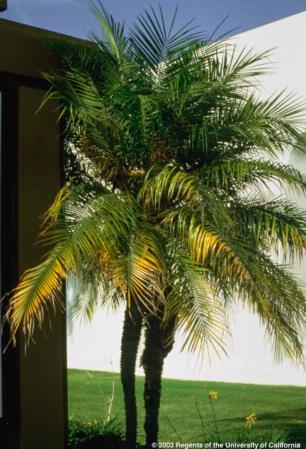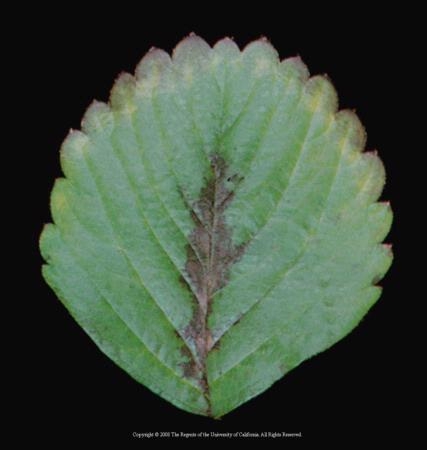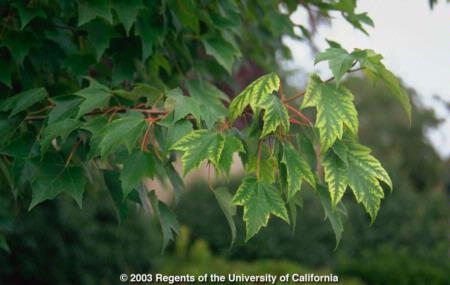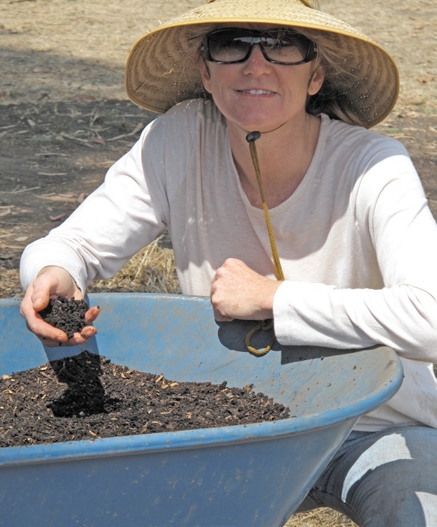
Posts Tagged: organic gardening
Essential elements and plant growth
There are 17 elements essential for plant growth. These elements come from the air, water and soil. All must be present for a healthy plant.
An excess, deficiency or even an imbalance of these elements may lead to individual symptoms which are characteristic to most plants. The appearance of a plant can be used to help identify problems. The problems can be corrected with appropriate fertilizers, amendments and manures and also by soil and water management.
To learn more about these essential elements and how to interpret distress signs plants may provide, please see this section of our website.



Soil and water management for vegetable gardens
Well structured soil and proper irrigation are vital components to growing healthy vegetable plants. UCCE’s Soil and Water Management of Vegetable Gardens brochure provides detailed information in a compact format.
Learn how to improve soil quality, when to fertilize vegetable plants, and how to efficiently irrigate your garden.
This free, downloadable resource can be found by clicking here for English and here for Spanish.
Due to a family emergency the March 26th Saturday at the Farm event has been cancelled. “Beefriending Your Local Bees” presented by Anna Howell, MS has been rescheduled for Saturday, April 2, 2011 from 10:00 a.m. to 11:30 a.m.
Soil Solarization for Gardens and Landscapes
Looking for an environmentally safe way to control soilborne pests? Solarization is a nonchemical method that can be successfully used to kill weeds, pathogens, nematodes and insects.
This process heats the soil to temperatures that are too high for the undesirable organisms to live. It also has the potential to improve soil structure, increasing the potential for healthy plants. Faster growing plants as well as higher and better quality yields are associated with solarized soil.
Another benefit of this method of soil preparation is that it can be used by home gardeners, landscape professionals, natural resource restoration projects and in production agriculture.
More information can be found in UC ANR’s Soil Solarization for Gardens and Landscapes pest note or for a more in-depth view and closely related subjects, please visit UC’s Solarization Informational Website.

Illustration by W. Suckow showing solarization steps.
Free Composting Class
Join expert composter Lorraine Walters on Saturday, September 4 and learn about composting, vermicompost and mulch to improve the health of your soil. Healthy soil can increase production, reduce the likelihood of insects and disease, reduce water needs and more.
This class will be held at Community Roots Garden. Scheduled topics include:
- How to make compost from common materials such as food scraps, grass clippings, and leaves.
- Faster composting methods that take more attention as well as the slower, easier methods.
- How to make extra high-grade compost using redworms (called vermicomposting).
- How to use compost to build your soil.
- How to use mulch to build your soil, and the difference between compost and mulch.
For further information please contact Community Roots Garden at 805/616-2326, info@communityrootsgarden.org or www.communityrootsgarden.org.

Composting expert, Lorraine Walters
Pollinator Resource Center
The Xerces Society is a nonprofit organization that protects wildlife through the conservation of invertebrates and their habitat. Within the organization there is a pollinator resource center. The center is a collaboration of the Xerces Society and Neal Williams at the University of California at Davis.
The pollinator resource center provides a lot of great information for everyone. In addition to the basics, the site covers:
- Ways to increase native bee populations at conventional agriculture sites
- A toolkit for organic farmers designed to educate about farming practices to reduce risk and harm to pollinators
- Pollinator habitat management, including prescribed burns and grazing areas
- Ways to increase pollinators in the garden
- The important role parks and golf courses can play in enhancing, restoring and creating habitat for these important creatures
- Resources for teachers
Fact sheets are found in the publication section of the website. They are great sources of information, and some of the links and titles are included below.
Native Pollinators on the farm: What’s in it for the growers? An overview of the contribution native bees make to crop pollination, and their value to agriculture.
Butterfly gardening. Learn how to convert your garden into a paradise for butterflies.
Plants for native bees in California. Learn which plants best support native bees in California.

